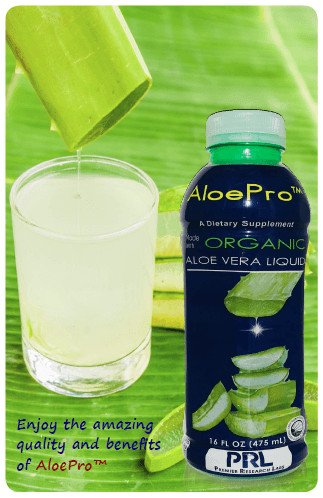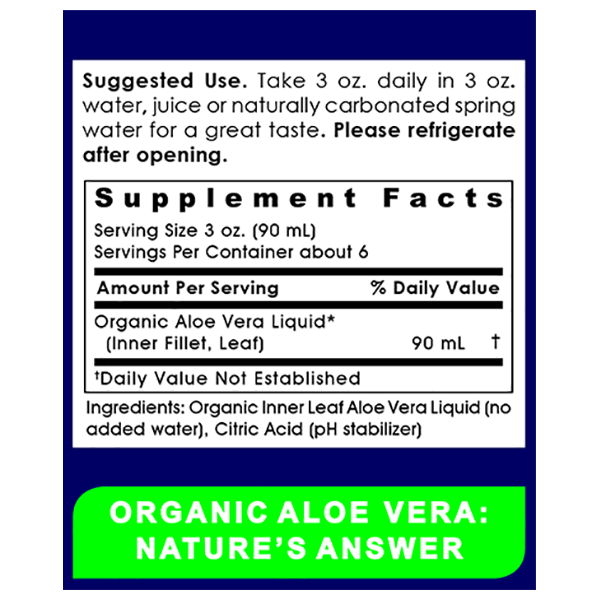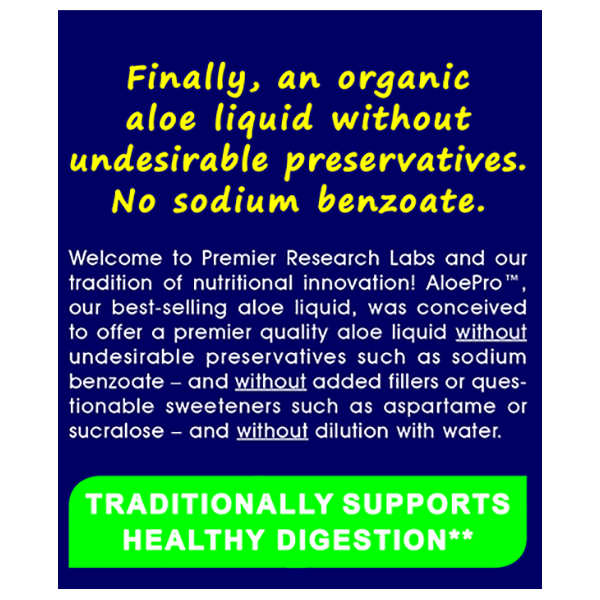AloePro™ (Discontinued)
$7.99
Organic Aloe Liquid
Traditionally Supports Healthy Digestion
No questionable preservatives or sweeteners
16 fl oz/bottle
Description
DISCONTINUED: Check for substitute soon
Organic Inner Leaf Aloe Vera Liquid
The Best of the Best
- Certified organic, full strength, inner leaf aloe liquid – not diluted with water
- No added sugar, artificial flavorings or artificial colors
- Naturally contains a full spectrum of vitamins, minerals, and amino acids
- No added sodium benzoate (a highly undesirable preservative)
- Contains naturally occurring organic acids
Lab Test Verified using state of the art proton nuclear magnetic resonance spectrometry (H NMR)
- Phyto-forensic screened for adulterants
- Purity verified
- Identity authenticated
- Naturally occurring active acemannan, a key phytonutrient
- No Artificially Enhanced Polysaccharides – NO MALTODEXTRIN
- No Dilution with Water
Aloe Vera: A Long History of Beneficial Use
Often called “the miracle plant”, Aloe vera is a plant of many surprises because of its broad spectrum of benefits. It flourishes in warm and dry climates where many people mistake Aloe vera for a cactus. Although Aloe vera does closely resemble a cactus, it is really classified as a succulent which belongs to the Lily family.
Ancient records show that the spectacular health benefits of Aloe vera have been known for centuries, used by many different cultures. The use of aloe for its premier health advantages have survived for thousands of years. Fifteen centuries before the birth of Christ, Egyptian writings acclaimed the benefits of the amazing aloe plant, even referring to it as a “sanctuary plant of immortality.” The earliest reference to Aloe vera and its use was found in 2200BCE on a Sumerian clay tablet. Cleopatra, Alexander the Great and Aristotle were fans of this unusual succulent and prized it for its soothing ability. Alexander the Great used Aloe vera to support his troops. Cleopatra relied on its skin-soothing emollients to help preserve her legendary beauty. Indians in Central and South America also commonly used it.
The Special Properties of Aloe
More than 200 species of Aloe vera exist, but only one particular species, Aloe Barbadensis Miller, is the most renowned for its general health-promoting properties. However, consumers should be cautious about aloe products that contain the wrong or ineffective species of aloe.
The expansive benefits of Aloe vera have been described in numerous scientific journals and reveal that Aloe vera contains naturally occurring essential nutrients including a whole array of natural vitamins, minerals, enzymes, protein, and amino acids.
However, it is not just the number of nutrients in a plant, but also the photonic light that naturally radiates from this plant that really counts. Aloe vera gel (the inner leaf jelly) has a diverse mixture of complex phytonutrients that deliver the reputation of this remarkable plant. Backed by worldwide scientific research, Aloe vera is used by millions of people around the world.
Unlocking Aloe’s Secrets
For many centuries, Aloe vera was used by kings to paupers for its spectacular effects. Even the Bible mentions the use of aloe. But to receive all of aloe’s benefits, manufacturing at the Premier Level is essential. Aloe vera leaves are generally ready for harvest after 3 years of age. Proper harvesting is a labor-intensive process and should take place as soon as possible due to the highly perishable nature of the juice, ideally within 36 hours of harvesting the leaves. Leaves that show signs of tip necrosis should not be harvested, as these may provide entry points for microbial contamination. After the thick leaves are hand-filleted to scoop out the precious mucilaginous gel, it should be used within a short time or preserved. If not, an enzyme in aloe can degrade its beneficial properties. To avoid this degradation, we use a special processing method.
Why Choose Aloe Pro?
In the marketplace, Aloe vera is available in many forms such as liquids, powders and freeze-dried. Unfortunately, even freeze-drying can break the delicate glycoside bonds of the aloe which can hinder its potency.
Our Premier Source of Aloe
Our Aloe vera is grown in the pristine countryside in Central America, miles from any city or heavy traffic. When the aloe is harvested, the outer leaves of the plant leaves are hand-picked so only fully mature leaves are selected (these contain the full spectrum of beneficial phytonutrients). The aloe plant is not uprooted and killed. Younger aloe plants are not used since they cannot yield the same results as fully developed mature aloe plants.
Genuine Quality Aloe – Where Trust Is Earned
We take our Aloe seriously at PRL! When a fresh lot of Aloe arrives at our plant, our scientists use Proton Nuclear Magnetic Resonance Spectroscopy (H NMR) to perform an entire panel of laboratory testing on this raw material which meets and exceeds the FDA’s requirements. Why? Because we believe that ultra-benefits of aloe are ONLY possible from ultra-quality aloe.
Unfortunately, numerous quality control issues are associated with Aloe vera products in the marketplace, including failure to differentiate between closely related species, the use of inappropriate raw aloe materials, improper processing of the leaves with failure to reduce the content of unwanted phenolic compounds, insufficient preservation of the aloe’s active constituents during processing and storage, and failure to avoid adulterants in the final product.
In contrast, Aloe Pro features ONLY genuine inner leaf aloe which is organic and has been hand-filleted – without adulterants. At PRL, before the preparation of our aloe begins, we first authenticate the botanical identity of the aloe (this helps to exclude a batch of aloe that may have been adulterated with the wrong species or other look-alike herbs). Sadly, the wrong species of aloe can be sold commercially which sometimes are not accurately labeled as the proper species. Next, our staff completes an in-depth phytoforensic screening where we inspect for undesirable inorganic materials and adulterants, such as herbicides and pesticides.
Our PRL quality guarantee ensures that our aloe meets FDA requirements for identity, purity, strength, and composition. We also test for a whole range of contaminants such as heavy metals (including arsenic, mercury, cadmium, and lead), residual solvents in extracts and pathogenic microbiology. The raw materials in this product have not been solvent extracted or heat damaged.
Ace your Life with Acemannan!
Our product, Aloe Pro, contains naturally occurring, active acemannan, a highly beneficial naturally occurring polysaccharide. Monosaccharides, oligosaccharides, and polysaccharides play a critical role in many aspects of human nutrition and health. The polysaccharides found in Aloe vera leaf are characteristic components of the aloe plant and thus, can be used for identification of the authenticity and quality of the products derived from the inner leaf of the Aloe vera plant. The mannose-rich polysaccharide, Acemannan, is predominately found in the inner leaf gel of Aloe vera and is considered one of the most important compounds for nutrition and health.
Acemannan has been identified as the main active ingredient in the inner leaf gel. Acemannan is composed of mannose, glucose, and galactose in a 31:1:1 ratio. Mannose, glucose, and galactose are counted among the eight important, essential monosaccharides critical to human health.
Acemannan and other polysaccharides have been extensively researched and are considered to be some of the most biologically active and beneficial components in Aloe vera. Currently, the only validated method for analysis of polysaccharide content is proton nuclear magnetic resonance spectrometry (H NMR). This method examines biomarkers of degradation by-products of polysaccharides (such as acetic, succinic and fumaric acids). When these acids are present, it signifies the aloe has been compromised. In addition, if aloe is exposed to excessive or prolonged heat, this H NMR test identifies whether formic acid is present – also a highly undesirable compound that forms during thermal degradation of critical polysaccharides such as glucose.
By using H NMR, PRL scientists routinely examine the polysaccharide composition and also authenticate Aloe Pro for its naturally occurring highly beneficial acemannan, glucose, malic acid, and other key components. With confidence, we state that Aloe Pro contains a significant amount of naturally occurring acemannan with NO ADDED maltodextrin to artificially enhance the polysaccharide content.
NO Artificially Enhanced Polysaccharides in our Aloe – NO MALTODEXTRIN
Sadly, maltodextrin is commonly used as a carrier during spray-drying of Aloe vera liquid in many powdered aloe concentrates. For this purpose, the industry often uses a ratio of maltodextrin to aloe liquid powder of 1:1. Maltodextrin may also be added to artificially enhance the polysaccharide content. This is why, historically, maltodextrin been one of the most common adulterants in Aloe vera inner leaf products. If not fully disclosed on the label, maltodextrin is considered to be an adulterant.
No Dilution with Water
In liquid aloe products, sometimes the liquid is not pure aloe liquid – in fact, it may have been purposely diluted with water. You may find that the total amount of actual aloe liquid in a product may be less than 10% — which means you are paying a high price for added water. If this high water content is not declared on the label, such products are out of compliance with labeling regulations. Our aloe contains NO added artificial flavorings, colorings or other undesirable additives… as well as NO ADDED WATER.
Watch out the Outer Leaf in Aloe Products! Go for ONLY Inner Leaf Aloe!
The leaf of Aloe vera consists of two major parts: the outer, tough, dark green rind and the inner, succulent, translucent, inner leaf. To obtain only the inner leaf liquid, the thick, outer rind is separated from the clear inner leaf gel and discarded prior to expressing the aloe liquid. This process, when properly done, can minimize the presence of the unwanted phenolic compounds, Aloin A and B, that naturally occur in the outer leaf. This process accomplished by trimming and removing the outer rind to yield ONLY the inner leaf gel.
Beware of Aloin
Recently, concerns have been raised regarding the potential toxicity of orally consumed Aloe vera products due to the potentially high concentration of phenolic compounds, such as aloin A and B, that naturally occur in the outer aloe leaf. To ensure your safety, PRL tests our product, Aloe Pro, for a special compound called isocitrate. If this compound is present, it can signify that parts of the outer leaf rind have been used in the product – and may contain the undesirable aloin compounds.
Why we test for Isocitrate & Isocitrate Lactone
Products labeled as “aloe vera inner leaf juice” should consist solely of the liquid from the inner leaf. If an Aloe vera leaf juice product contains more than 5% dry weight of isocitric acid, it should be NOT labeled as “aloe vera inner leaf”, but as simply “aloe vera leaf”. This is why PRL tests for isocitric acid & Isocitrate lactones (markers for aloin) – to be sure Aloe Pro delivers you ONLY pure, organic inner leaf aloe liquid without Aloin!
Testing for Freshness
As much as 75% of the solids in aloe vera leaf and inner leaf liquid may consist of organic acids, metal ions, and chloride. Malic acid is the most abundant organic acid in Aloe vera inner leaf liquid. Since malic acid is prone to bacterial degradation to lactic acid by Lactobacillus spp., the content of malic acid can be used as a marker for “freshness” and quality of aloe vera leaf and inner leaf liquid.
Just say NO to sodium benzoate!
Sadly, many companies use undesirable preservatives to stabilize their liquid aloe, such as sodium benzoate (a benzene derivative and suspected carcinogen) and potassium sorbate. These highly questionable preservatives can potentially create liver and kidney stress – and certainly, don’t belong in your aloe product in our opinion.
PRL takes a solid stand against its use. We believe sodium benzoate has NO place in nutritional supplements and is best avoided. As you can see, through our rigorous manufacturing and quality control standards, PRL strives to deliver a highly consistent quality product that contains premier quality aloe manufactured without added undesirable preservatives.
Premier Research Lab’s vision is twofold: first, to develop only the most premier quality aloe products by using aloe plants that have been carefully selected for their naturally high cellular resonance. Secondly, our aloe products have absolutely no undesirable tagalongs. To completely eliminate the need for “deal-breaker” preservatives such as sodium benzoate, methylparaben and others, we developed a unique process using only natural, food-grade agents to stabilize our premier-grade aloe – giving you all the goodness of aloe but without the undesirable tagalongs.
Beams of Light
Aloe plants naturally contain photonic packets of sunlight trapped in their chlorophyll molecules, giving aloe its green color and vibrancy. These internal packets of sunlight boost electrons from a ‘ground state’ to a high energy level, from where the electrons are able to cascade down an energy ‘staircase’.
HUMANS ARE LIGHT EATERS
Nobel Prize laureate Albert Szent-Györgyi once stated, “We live by a small trickle of electricity from the sun.” The human body essentially acts as a living battery – continually absorbing energized photons from the immediate atmosphere and from food.
The miracle of photosynthesis transforms the sun’s light frequencies into green plants, trees, grasses, and herbs – which when consumed, are able to release nutrients and multiple light frequencies into the cells of the body. In addition, as humans, we can directly absorb light energies from the sun into the cells of our bodies.
As one scientist aptly noted: “Humans are light eaters.” Premier quality nourishment must accomplish two tasks: 1)It must allow assimilation of the full spectrum of this light bio-energy throughout the cells of the body and 2) It must couple this light bio-energy with living nutrients that can be rapidly absorbed and assimilated into the cells of our bodies.
Is it possible that many aloe products on the market are simply devoid of this amazing “light” bio-energy concentration due to the use of synthetic preservatives (such as sodium benzoate), or from the fact that their aloe is highly heated, which can obliterate the aloe’s beneficial phytonutrient compounds?
Many commercial aloe products may claim to be 99% pure, freeze-dried or cold pressed, but do they offer many benefits? Research has shown only aloe that has been meticulously grown, then carefully processed to maintain its active constituents, can deliver the perfect partner for anyone’s personal daily health program.
Aloe Pro contains absolutely no added compromising binders and fillers – delivering to you the finest grade aloe (the true species) — without unwanted tagalongs.
Please enjoy this premier quality aloe product
for you and your family.
Additional information
| Weight | 1.23 lbs |
|---|




Reviews
There are no reviews yet.